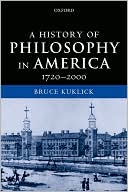

 |

|

The average rating for History of Philosophy in America, 1720-2000 based on 2 reviews is 5 stars.
Review # 1 was written on 2017-03-26 00:00:00 Erich Arndt Erich ArndtAn Overview Of American Philosophy Bruce Kuklick, professor of history at the University of Pennsylvania, has written extensively about American philosophy and theology as well as about American social thought While his most recent book, "Intellectuals at War" deals with the impact of ideas on officials in high places, Professor Kuklick's "A History of Philosophy in America 1720 -- 2000" tells the story of American philosophy from the colonial era to the present. The book draws upon Professor Kuklick's earlier study of philosophy at Harvard, "The Rise of American Philosophy" and upon his study of American theology "Churchmen and Philosophers". In his Introduction, Professor Kuklick defines the philosophical endeavor as a "more or less systematic writing about the point of our existence." Professor Kuklick finds that American thought remained under the sway of theology for a longer period than was the case in Europe. Again in his Introduction, Professor Kuklick locates the general direction of American thought in the "long circuitous march from a religious to a secular vision of the universe." He describes the long influence of idealism in America, followed by a closely-related pragmatism, to the current uneasily-prevailing materialistic and scientific philosophy. Throughout the book, Professor Kuklick admirably draws parallels between American approaches to philosophy at different times. Thus, the book opens with a lengthy consideration of Puritan thought beginning with Jonathan Edwards and proceeding about through the time of the Civil War. For Professor Kuklick, this thought was dominated by the theology of Calvinism and focused on the individual and his relationship to God. The pragmatic thought which succeeded theologically-based philosophy tended, with exceptions, to be idealistic in character and viewed idealism as a means of reconciling Darwinism with a sense of human meaning. Peirce and James developed their distinctive pragmatisms while John Dewey developed his different, experimentally based form of instrumentalism. The pragmatic school represented the high-water mark of philosophy in the United States, and it was followed by an era of professionalization and fragmentation, under the influence of the growth of science and a variety of European thinkers, including Wittgenstein, the Frankfurt school, and existentialism. In the final portion of his book, Professor Kuklick gives substantial attention to the work of Quine, Kuhn, and Richard Rorty. Professor Kuklick is critical of American philosophy for its relative neglect of social and political issues. He attributes this neglect to the initial questions posed by philosophers concerning the relationship of the individual to the Divine, with social philosophy relegated to an afterthought. He fears, as have many before him, that with its focus on analysis, professional philosophy has lost the ability to engage people's minds and hearts that it possessed during the time of James, Royce, and Dewey. A related theme of this book involves the various ways different universities pursued philosophy and the influence they exercised. Broadly speaking, Harvard and the philosophy departments under its orbit became predominant in the age of pragmatism and expanded this dominance as philosophy grew closer to the sciences in outlook. Yale was more heavily influenced by theology and struggled for many years to find an identity for its practice of philosophy different from the scientifically-oriented thinking of Harvard. These alternatives would include, among other things, traditional metaphysical idealism and phenomenology and existentialism. I found this discussion struck a personal note as it reminded me of the time, many years ago, when I applied for and was accepted into the graduate philosophy program at Yale, a course I did not pursue. While philosophy remains a troubled endeavor, Professor Kuklick believes that "reflective people throughout American history have needed something like philosophy. They have wanted its synthesis of instruction and argumentation, and in all likelihood they will find a way of extracting this mix from the cultural vision in which they find themselves." (p.285) Professor Kuklick has written a learned history which itself is a work of philosophy in that it shows deep insight into the nature of the discipline and into the thought of the many thinkers it considers. These thinkers include, besides those I have mentioned earlier, Ralph Barton Perry, Roy and Wilfred Sellars, C.I. Lewis, Arthur Lovejoy, Paul Weiss, Nelson Goodman, Saul Kripke, Hilary Putnam, and many others. It is a study that has remained fascinating to me over many years. Readers interested in philosophical thought and its development will benefit from this book. Robin Friedman |
Review # 2 was written on 2019-01-29 00:00:00 Angelo Ditullio Angelo DitullioI read this years ago. While one might complain the work is either too short for a subject that demands more detail or it is almost right in where it focuses. Even with a certain density the texts sometimes almost reads as glosses. Professor Kuklick explains why in his introduction. This is not a history of all American philosophy but a review of core elements. Professor Kuklich is lucid-a big plus for me. There is a fair amount of American Philosophical Association history that turns out to be useful as well as entertaining. I like how he begins with religion in America as the motivating source of our history of speculative thought but after reviewing pragmatism the basic focus becomes academic philosophy . This work caused me to look at aspects of American history I had neglected. I read it when I was still actively intrigued by the subject. I highly recommend it. |
CAN'T FIND WHAT YOU'RE LOOKING FOR? CLICK HERE!!!